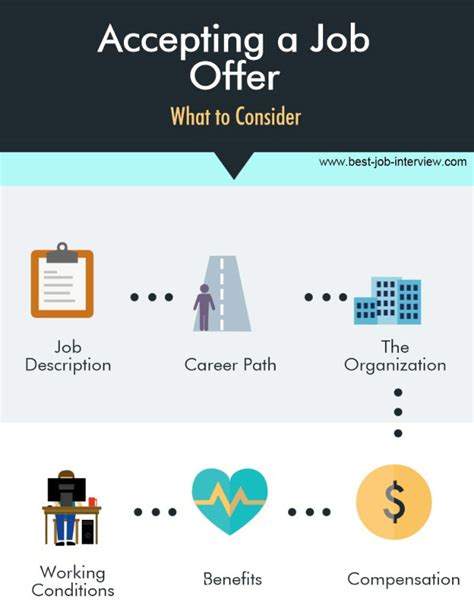Job Offer Acceptance: Step-By-Step Guide With Example And Tips

Accepting a job offer can be both exciting and nerve-wracking at the same time. You may be thrilled to start a new chapter in your career but also anxious about making the right decision. This guide will walk you through the process of accepting a job offer, from evaluating the offer to sending a formal acceptance letter.
1. Evaluate the Job Offer
Before accepting a job offer, it’s important to evaluate the offer to ensure that it aligns with your career goals and expectations. Here are some factors to consider:
- Salary and benefits package
- Job responsibilities and duties
- Work-life balance
- Company culture and values
- Opportunities for growth and advancement
Take some time to think about what matters most to you in a job and how this offer measures up. If you have any questions or concerns about the offer, don’t hesitate to reach out to the employer for clarification.
2. Express Gratitude
Once you’ve evaluated the offer and decided to accept, the first step is to express gratitude to the employer. This can be done through a phone call or email.
Thank the employer for the opportunity and let them know how excited you are to join their team. This will help to establish a positive relationship with your new employer from the start.
3. Confirm the Details
Before sending a formal acceptance letter, it’s important to confirm the details of the offer with the employer. This includes the start date, salary, benefits, and any other important information.
Make sure that you have a clear understanding of what is expected of you and what you can expect from the employer. This will help to avoid any misunderstandings or confusion down the road.
4. Send a Formal Acceptance Letter
Once you have confirmed the details of the offer, it’s time to send a formal acceptance letter. This should be a professional and concise letter that confirms your acceptance of the job offer.
The letter should include:
- Your name and contact information
- The date
- The employer’s name and contact information
- A statement of acceptance
- The terms and conditions of the offer
- A request for a written confirmation of the terms
Be sure to proofread the letter carefully and make sure that it is free of errors. This letter will serve as a legal document and should be treated as such.
5. Prepare for Your First Day
After accepting the job offer, it’s important to prepare for your first day on the job. This includes:
- Reviewing the company’s policies and procedures
- Preparing any necessary paperwork
- Getting familiar with your new team and colleagues
- Preparing any necessary equipment or materials
By being prepared for your first day, you’ll be able to hit the ground running and make a positive impression on your new employer.
6. Follow Up
After accepting the job offer and starting your new position, it’s important to follow up with the employer to ensure that everything is going smoothly.
Check in with your supervisor regularly and ask for feedback on your performance. This will help you to make any necessary adjustments and ensure that you are meeting the expectations of your new employer.
Conclusion
Accepting a job offer is an important decision that should not be taken lightly. By following these steps, you can ensure that you are making the right decision and starting your new job on the right foot.
FAQs
How long do I have to accept a job offer?
The employer will typically set a deadline for accepting the job offer. This is usually within a few days to a week after the offer is made.
Can I negotiate the terms of the job offer?
Yes, you can negotiate the terms of the job offer. However, it’s important to approach this in a professional and respectful manner. Do your research and come prepared with reasonable requests.
What should I do if I change my mind after accepting a job offer?
If you change your mind after accepting a job offer, it’s important to notify the employer as soon as possible. Be honest and respectful in your communication and explain your reasons for the change of heart.
What if I have multiple job offers?
If you have multiple job offers, it’s important to weigh the pros and cons of each offer and choose the one that best aligns with your career goals and expectations. Be honest and transparent with the employers and let them know that you are considering multiple offers.
Related Institutions:
Harvard Business School
Stanford Graduate School of Business
